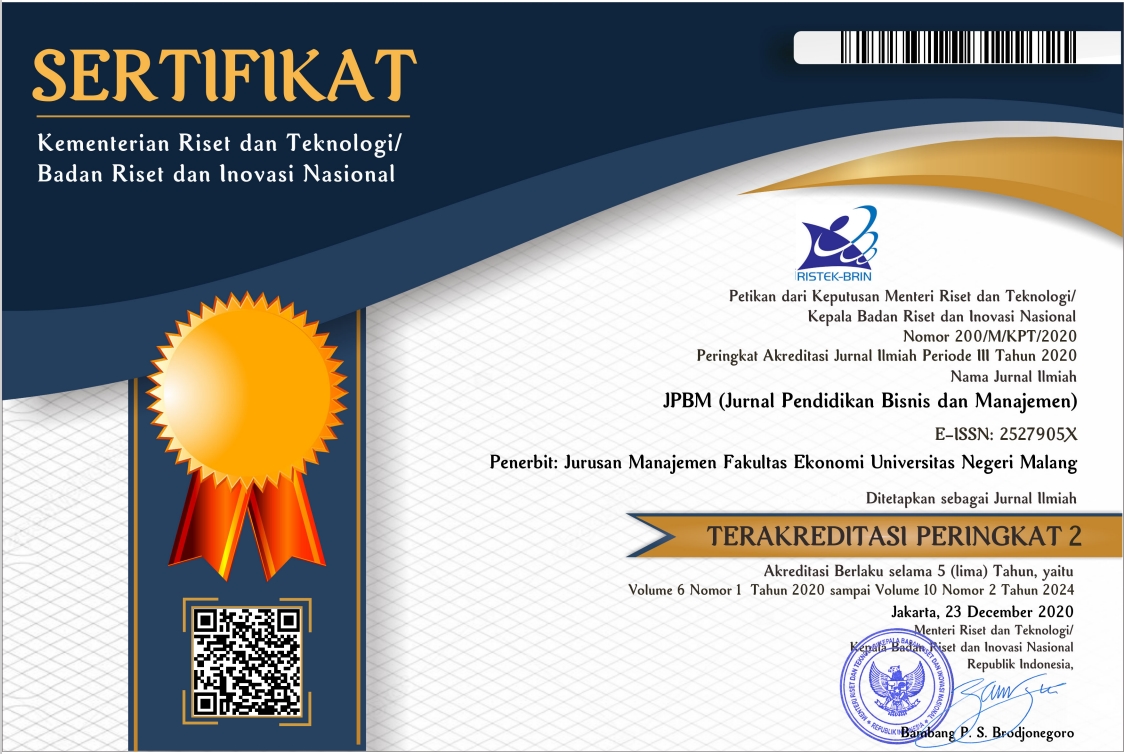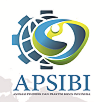Developing a Higher Order Thinking Skill-Oriented and Metacognitive-Based Assessment for Vocational School Students
Abstract
Keywords
Full Text:
PDFReferences
Akbar, S. (2016). Instrumen perangkat pembelajaran. Bandung: PT. Remaja Rosdakarya.
Arifin, Z. (2014). Evaluasi pembelajaran: prinsip, teknik, dan prosedur. Bandung: PT. Remaja Rosdakarya.
Arifin, Z., & Retnawati, H. (2017). Pengembangan instrumen pengukur higher order thinking skills matematika siswa SMA Kelas X. Pytha Jurnal Pend. Math 12(1), 98. https://Doi.Org/10.21831/Pg.V12i1.14058
Arikunto, S. (2015). Dasar-Dasar Evaluasi Pendidikan Edisi 2. Jakarta: PT. Bumi Aksara.
Bakar, M. A. A., & Ismail, N. (2019). Metacognitive learning strategies in mathematics classroom intervention: a review of implementation and operational design aspect. International Electronic Journal Mathemathics Education, 15(1), 1-9. https://doi.org/10.29333/Iejme/5937
Borg, W. R., & Gall, R. (2003). Educational research: an introduction, 7th Ed. New York: Logman Inc.
Bowler, L. (2010). A taxonomy of adolescent metacognitive knowledge during the information search process. Library & Information Science Research 32(1), 27–42. https://doi.Org/10.1016/j.Lisr.2009.09.005
Bran, C.-N., & Balas, E.-C. (2011). Metacognitive regulation and in-depth learning. a study on the students preparing to become teachers. Procedia - Social and Behavioral Sciences 11, 107–111. https://doi.org/10.1016/j.sbspro.2011.01.043
Brookhart, S. A. (2010). How to assess high-order thinking skills in your classroom. Virginia: Ascd.
Budiman, A., & Jailani, J. (2014). Pengembangan instrumen asesmen higher order thinking skill (HOTs) pada mata pelajaran matematika SMP kelas VIII semester 1. Jurnal Riset Pendidikan Matematiika 1(2) 139-151. https://doi.org/10.21831/jrpm.V1i2.2671
Chen, J. H., Björkman, A., Zou, J. H., & Engström, M. (2019). Self–regulated learning ability, metacognitive ability, and general self-efficacy in a sample of nursing students: a cross-sectional and correlational study. Nurse Education in Practice 37, 15–21. https://doi.org/10.1016/j.nepr.2019.04.014
Chevron, M. P. (2014). A metacognitive tool: theoretical and operational analysis of skills exercised in structured concept maps. Perspectives in Science 2, 46–54. Https://doi.org/10.1016/j.pisc.2014.07.001
Daryanto. (2012). Evaluasi pendidikan. Jakarta: PT. Rineka Cipta.
Enger, K.S., & Yager, E.R. (2009). Assesing student understanding in science, 2nd ed. California: Corwin A Sage Company.
Fitriana, M. (2016). Penggunaan strategi pembelajaran inkuiri untuk meningkatkan metakognisi siswa SMA 10. Jurnal Inovasi Pendidikan Kimia 10(1), 1702-1711.
Higgins, S. (2017). Managing higher-order thinking skills, in: managing academic libraries. Elsevier. https://doi.org/10.1016/b978-1-84334-621-0.00004-2
Iskandar, S. M. (2014). Pendekatan keterampilan metakognitif dalam pembelajaran sains di kelas. Erudio Journal of Educational Innovation, 2(2), 13–20. https://doi.org/10.18551/erudio.2-2.3
Jarvis, M. A., & Baloyi, O. B. (2020). Scaffolding in reflective journaling: a means to develop higher order thinking skills in undergraduate learners. International Journal of Africa Nursing Sciences 12, 100195. https://doi.org/10.1016/j.ijans.2020.100195
Kartika, D. L., & Sujadi, I. (2015). Proses metakognisi dalam pemecahan masalah matematika pada siswa kelas XI di SMA Negeri Banyumas. Jurnal Pembelajaran Matematika, 3(9), 1021-1034.
Künsting, J., Kempf, J., & Wirth, J. (2013). Enhancing scientific discovery learning through metacognitive support. Contemporary Educational Psychology, 38(4), 349–360. https://doi.org/10.1016/j.cedpsych.2013.07.001
Kurniati, D., Harimukti, R., & Jamil, N. A. (2016). Kemampuan berpikir tingkat tinggi siswa smp di kabupaten jember dalam menyelesaikan soal berstandar pisa. Jurnal Penelitian dan Evaluasi Pendidikan, 20(2), 142-155. https://doi.org/10.21831/pep.v20i2.8058
Kusaeri. (2014). Acuan dan teknik penilaian proses dan hasil belajar dalam kurikulum 2013. Yogyakarta: Ar-Ruzz Media.
Kyriakides, L., Anthimou, M., & Panayiotou, A. (2020). Searching for the impact of teacher behavior on promoting students' cognitive and metacognitive skills. Studies in Educational Evaluation, 64, 100810. https://doi.org/10.1016/j.stueduc.2019.100810
Lee, S. M. (2014). The relationships between higher order thinking skills, cognitive density, and social presence in online learning. The Internet and Higher Education 21, 41–52. https://doi.org/10.1016/j.iheduc.2013.12.002
Lestari, C. F., Kristiana, A. I., & Kurniati, D. (2016). Pengembangan paket tes matematika berbasis kemampuan berpikir tingkat tinggi siswa kelas X TKJ SMK materi sistem persamaan linier. Jukasi 3, 34. https://doi.org/10.19184/jukasi.v3i2.3527
Masari, G. A., & Anghel, O. (2012). Comparative study on developing metacognitive abilities of students from technical, vocational and human sciences. Procedia - Social and Behavioral Sciences 46, 4418–4422. https://doi.org/10.1016/j.sbspro.2012.06.266
Narmaditya, B. S, Wulandari, D., & Sakarji, S. R. B. (2018). Does problem-based learning improve critical thinking skill?. Cakrawala Pendidikan, 37(3), 378-388
Netri, N., Holiwarni, B., & Abdullah. (2018). Development of test instruments based higher order thinking skill (HOTs) on chemical equilibrium at second grade in senior high school. JOM FKIP, 5(2), 1-11.
Nguyen, T. M. T., & Nguyen, T. T. L. (2017). Influence of explicit higher-order thinking skills instruction on students' learning of linguistics. Thinking Skills and Creativity, 26, 113–127. https://doi.org/10.1016/j.tsc.2017.10.004
Nickerson, R. S. (1988). Improving thinking through instruction. Review of Research in Education 15(1), 3–57. https://doi.org/10.3102/0091732x015001003
Nofiana, M. (2016). Pengembangan instrumen evaluasi higher order thinking skills pada materi kingdom plantae. Pedagogi Hayati, 1(1), 46-53.
Pilten, G. (2010). Evaluation of the skills of 5th grade primary school students' high-order thinking levels in reading. Procedia - Social and Behavioral Sciences, 2, 1326–1331. https://doi.org/10.1016/j.sbspro.2010.03.195
Pintrich, P. R. (2002). The role of metacognitive knowledge in learning, teaching, and assessing. Theory Into Practice, 41(4), 219–225.
Pratiwi, U., & Fasha, E. F. (2015). Pengembangan instrumen penilaian hots berbasis kurikulum 2013 terhadap sikap disiplin. Jurnal Penelitian Pembelajaran IPA 1(1), 123-142. https://doi.org/10.30870/jppi.v1i1.330
Roets, L., & Maritz, J. (2017). Facilitating the development of higher-order thinking skills (hots) of novice nursing postgraduates in africa. Nurse Education Today 49, 51–56. https://doi.org/10.1016/j.nedt.2016.11.005
Romli, M. (2012). Strategi membangun metakognisi siswa sma dalam pemecahan masalah matematika. Aksioma: Jurnal Matematika dan Pendidikan Matematika, 17, 1-16.
Saputra, H. (2016). Pengembangan mutu pendidikan menuju era global: penguatan mutu pembelajaran dengan penerapan HOTS (higher order thinking skills). Bandung: Smile’s Publishing.
Sari, A. T. I. (2018). Pengembangan lembar kegiatan peserta didik (LKPD) berbasis higher—order thinking skills (HOTS) pada mata pelajaran akuntansi perbankan syariah kelas XI semester II. Jurnal Pendidikan Akuntansi, 6(3), 230-238.
Sari, D. R. U., Wahyuni, S., & Bachtiar, R. W. (2018). Pengembangan instrumen tes multiple choice high order thinking pada pembelajaran fisika berbasis e-learning di sma. Jurnal Pembelajaran Fisika, 7(1), 100-107. https://doi.org/10.19184/jpf.v7i1.7231
Sastrawati, E., & Rusdi, M. (2011). Problem-based learning, strategi metakognisi, dan keterampilan berpikir tingkat tinggi siswa. Teknopedagogi, 1, 14.
Sudjana, D., & Wijayanti, I. E. (2018). Analisis keterampilan metakognitif pada materi kelarutan dan hasil kali kelarutan melalui model pembelajaran pemecahan masalah. Educhemia, 3(2), 206-221. https://doi.org/10.30870/educhemia.v3i2.3729
Surasa, N. N., Witjaksono, M., & Utomo, S. H. (2017). Proses belajar siswa dalam meningkatkan kemampuan berpikir kritis mata pelajaran ekonomi SMA. Jurnal Pendidikan: Teori, Penelitian, dan Pengembangan, 2(1), 78-84
Tal, R., & Hochberg, N. (2003). Assessing high order thinking of students participating in the "wise" project in Israel. Studies in Educational Evaluation, 29(2), 69–89. https://doi.org/10.1016/s0191-491x(03)00016-6
Taub, M., Sawyer, R., Smith, A., Rowe, J., Azevedo, R., & Lester, J. (2020). The agency effect: the impact of student agency on learning, emotions, and problem-solving behaviors in a game-based learning environment. Computers & Education, 147, 103781. https://doi.org/10.1016/j.compedu.2019.103781
Uno, H. B., & Koni, S. (2012). Assessment pembelajaran. Jakarta: Bumi Aksara.
Vrieling, E. M., Bastiaens, T. J., & Stijnen, S. (2012). Effects of increased self-regulated learning opportunities on student teachers' metacognitive and motivational development. International Journal of Educational Research, 53, 251–263. https://doi.org/10.1016/j.ijer.2012.03.014
Wardany, K., & Ramli, M. (2017). Pengembangan penilaian untuk mengukur higher order thinking skills siswa. Inkuiri: Jurnal Pendidikan IPA, 6(2), 1-12.
Widana, I. W. (2017). Modul penyusunan soal hots tahun 2017. Jakarta: Departemen Pendidikan Dan Kebudayaan.
Wing, C. K., Piaw, C.Y., & Chang, P. K. (2014). Effects of aural-imitative and aural-motivic analyses on higher-order thinking skill and creative musical product in music improvisation. Procedia - Social and Behavioral Sciences, 116, 5130–5134. https://doi.org/10.1016/j.sbspro.2014.01.1086
Wu, L. Y. (2016). Children's Formation and representations of money-related thinking in graphical complexes: compound relation operations and creative high-order thinking. Thinking Skills and Creativity, 19, 232–245. https://doi.org/10.1016/j.tsc.2015.12.001
Yang, Y. T. C. (2015). Virtual ceos: a blended approach to digital gaming for enhancing higher order thinking and academic achievement among vocational high school students. Computers & Education, 81, 281–295. https://doi.org/10.1016/j.compedu.2014.10.004
Yee, M. H., Yunos, J. Md., Othman, W., Hassan, R., Tee, T. K., & Mohamad, M. M. (2015). Disparity of learning styles and higher order thinking skills among technical students. Procedia - Social and Behavioral Sciences, 204, 143–152. https://doi.org/10.1016/j.sbspro.2015.08.127
Yerizon, Y. (2019). Pengembangan lembaran kerja matematika smp berbasis pendekatan metakognisi untuk meningkatkan higher order thinking skill peserta didik. Jurnal Pendidikan Matematika dan Sains Matematika, 4, 143–153. https://doi.org/10.31629/jg.v4i2.1418
Zheng, L., Li, X., Zhang, X., & Sun, W. (2019). The effects of group metacognitive scaffolding on group metacognitive behaviors, group performance, and cognitive load in computer-supported collaborative learning. The Internet and Higher Education, 42, 13–24. https://doi.org/10.1016/j.iheduc.2019.03.002
Zumbach, J., Rammerstorfer, L., & Deibl, I. (2020). Cognitive and metacognitive support in learning with a serious game about demographic change. Computers in Human Behavior, 103, 120–129. https://doi.org/10.1016/j.chb.2019.09.026
DOI: http://dx.doi.org/10.17977/um003v6i12020p010
Refbacks
- There are currently no refbacks.
JPBM (Jurnal Pendidikan dan Bisnis Manajemen) is licensed under a Creative Commons Attribution-NonCommercial-ShareAlike 4.0 International License.
JPBM (Jurnal Pendidikan dan Bisnis Manajemen) is abstracted and indexed in :
















